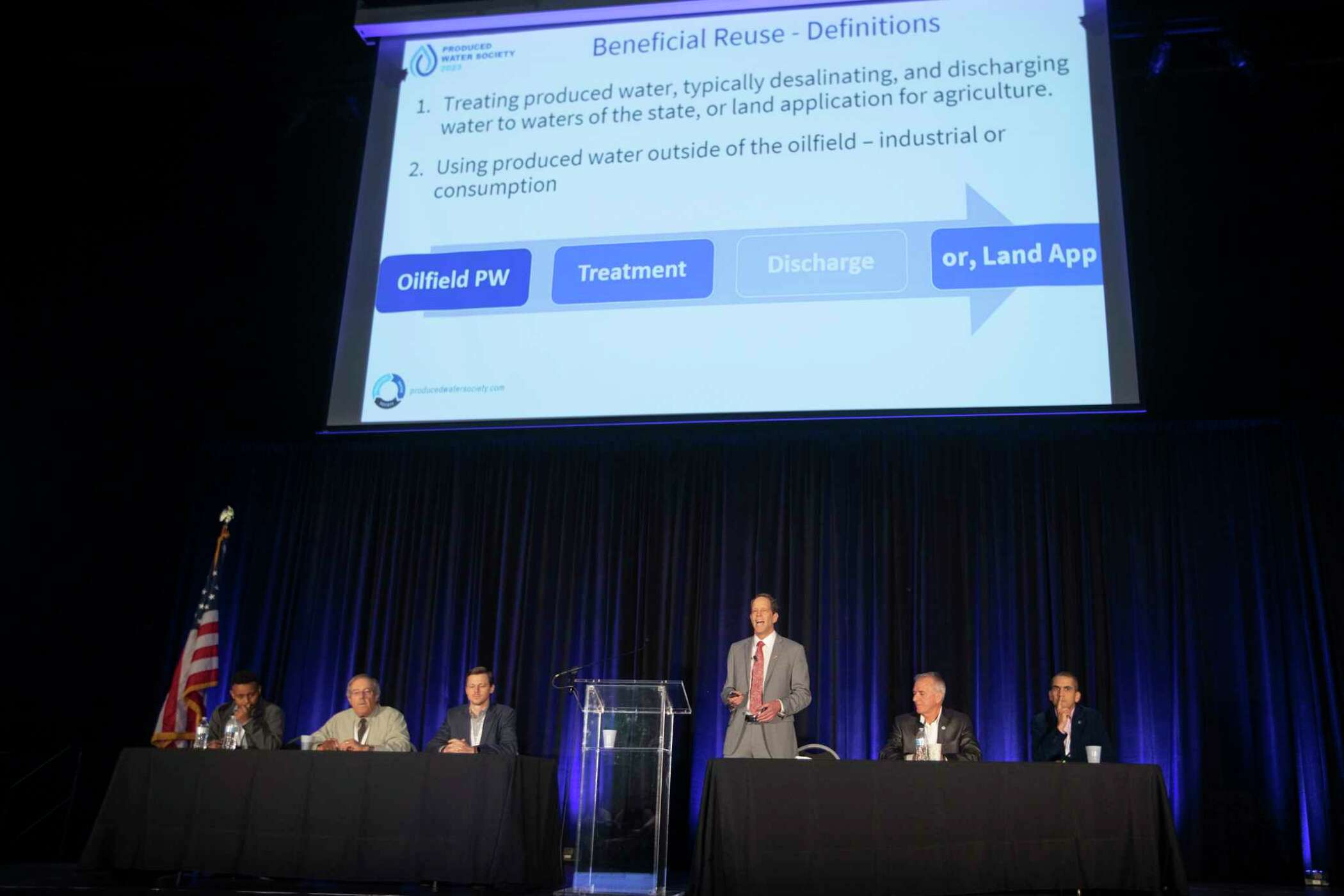Produced Water Society summit: Speakers highlight urgency of beneficial reuse of produced water

Tetra TechÕs Michael Dunkel, center right, speaks about the beneficial reuse of produced water in the Permian Basin at the 2023 Produced Water Society Permian Basin conference Tuesday at the Midland County Horseshoe Pavilion.Jacob Ford/The Oilfield Photographer
Those attending the Produced Water Society’s Permian Basin summits have heard best practices in water management and a rising number of presentations on technologies advancing produced water recycling and reuse.
In recent years, the topic of beneficial reuse of produced water outside the oil industry has been rising to the top of the radar. But this year, attendees got a wake-up call about the increasing urgency of advancing that beneficial reuse.
“We live in an arid region and we’re putting precious water downhole, which is stupid,” said Mike Hightower, director of the New Mexico Produced Water Research Consortium.
This region is in the 100th year of a 300-year arid cycle, and he warned, “West Texas and eastern New Mexico cannot last another 30 years of this. There is no other water source.”
Permian Basin residents “won’t survive in this part of the country and do what we need to do to provide for US energy security unless we address produced water and beneficial reuse,” he stated.
The goal is to reduce or eliminate the use of fresh water in oil and gas operations and create new supplies, he said. And, he added, he didn’t care if those living in New York or San Francisco or Boston or Washington D.C. have to pay 5 cents more for energy if it ensures future water supplies for Permian Basin children.
Technology is reaching the point that it can help the industry address the various constituents in produced water and make it safe for beneficial reuse, he said. He predicted one thing that will incentivize recycling and beneficial reuse of produced water will be the rising cost of disposing of it, forecasting it will rise to $1 to $1.25 per barrel by 2025 or 4% of the price of a barrel of oil.
“We have to provide new water for economic development and assure cost-effective treatment and public and environmental safety,” Hightower said. “We’re at the point where we have to row together. We all need to pull together, and I think we can.”
Beneficial reuse is one of the most noble efforts the industry is undertaking, Robert Crain, executive vice president, Texas Pacific Water Resources, told the gathering as he opened the first day of the conference.
Technology and a commercial model that works are the paths to beneficial reuse, he said. Pricing must be economic, there must be a reliable and repeatable discharge conduit and landowners must receive compensation to offset the loss of disposal royalties, Crain said.
Beneficial reuse can also displace water that would otherwise be destined for injection into shallow formations, turning a waste product into a resource.
“To think,” he marveled, “We’re at the forefront of designing something that will solve a functionality problem while providing a new resource.”
Crain said it is so important to gather and discuss water-related issues, especially in the Permian Basin, where oil production is expected to plateau at 7.5 million barrels a day by 2029. Along with that crude, he said the region will produce an additional 6 million to 7 million barrels of water per day through 2030.
Even if oil and gas producers used only produced water in their operations, 40 to 60% would still have to be injected into disposal wells. Recycling of produced water has been a tremendous success story, Crain said, but operators are reaching the limits of what can be done.
Still, he said the increase in recycling of produced water is having a positive impact on the area’s environment. Crain said a 65% decrease in injection volumes has led to a 35% decrease in seismic events.
As the world undergoes what Crain called the energy expansion, “there will be a lot of misconceptions, a lot of miscommunication. But as common sense takes hold and people see the energy expansion, they will come to understand what we’re doing. There will still be some who demonize the industry, but continue to innovate, continue to think outside the box, continue to roll the dice.”
Mella McEwen is the Oil Editor for the Midland Reporter-Telegram.
 information@eb5southwest.com
information@eb5southwest.com












